| Home > Policy > White Paper, Notice, Announcement > White Paper > WHITE PAPER ON SCIENCE AND TECHNOLOGY2003 > Part1 1.3 1.3.2 1.3.2.2 | ||
| (1)Changes and Response to Companies'Needs for Human Resources |
Here follows an examination of the demands that companies make on researchers for the needs of society,and on the relationship of those demands to those researchers who,among all scientific and technological human resources,are fostered at universities or other educationalinstitutions and then hired by corporations.
| (Evaluations of Graduate Schools by Companies) |
In recent years,shorter research and development times,and increasingly severe international competition alongside advancing globalization,is forcing changes to corporate strategies for research and development activities.Previously,corporate in-house education was the preferred method for developing and securing human resources,and education at universities was viewed with a certain degree of disdain.In recent years,however,even corporations have increasingly tended to look for personnel who can have an immediate impact.In addition,as standards for corporate research and development activities become higher,the activities of Ph.D.holders with advanced and specialized knowledge and technology will become increasingly important for the future progress of science and technology in Japan as a whole.
In private-sector enterprises,where60%of Japan's researchers are located,and where many graduate school students are accepted,many report that the quality of new hires coming out of graduate schools is lower than they were expecting (Figure1-3-64) .Specifically,private-sector enterprises revealed dissatisfaction with education in graduate schools,with such comments as"they lack practical education in research planning and proposals,and in experiments,data processing,and preparation of scientific papers in their fields of expertise"and"since much of their work was assistance for a professor's research,they lack experience in their own research,"particularly regarding the"originality"and"creativity"that are such important qualifications for researchers (Figure1-3-65) .
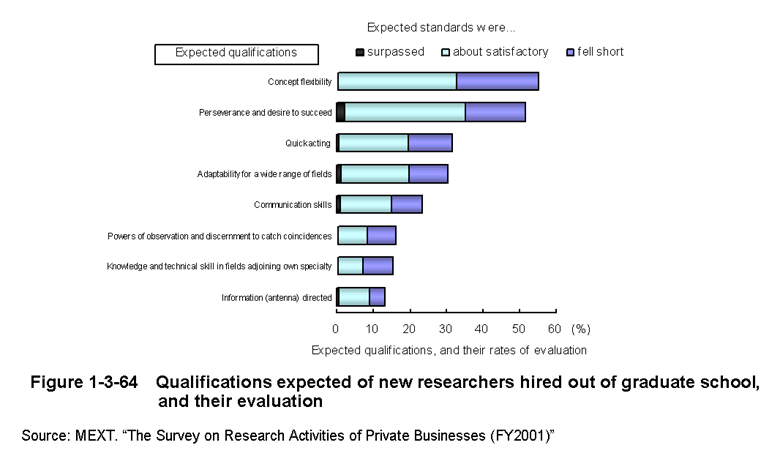
Other criticisms of university education include limitation of education content in doctoral courses to a narrow field,and failure of education methods to teach students how to pursue research on their own.When corporations were asked what they wanted to see in university and graduate school education for students,their responses included"let students acquire thinking ability rather than give them knowledge"and"change the method of entrance examination from evaluating only the volume of knowledge to evaluating critical thinking,interest,quality,etc.from various angles."As the results show,many corporations want education to escape from an excessive tilt toward knowledge (Figure1-3-66) .
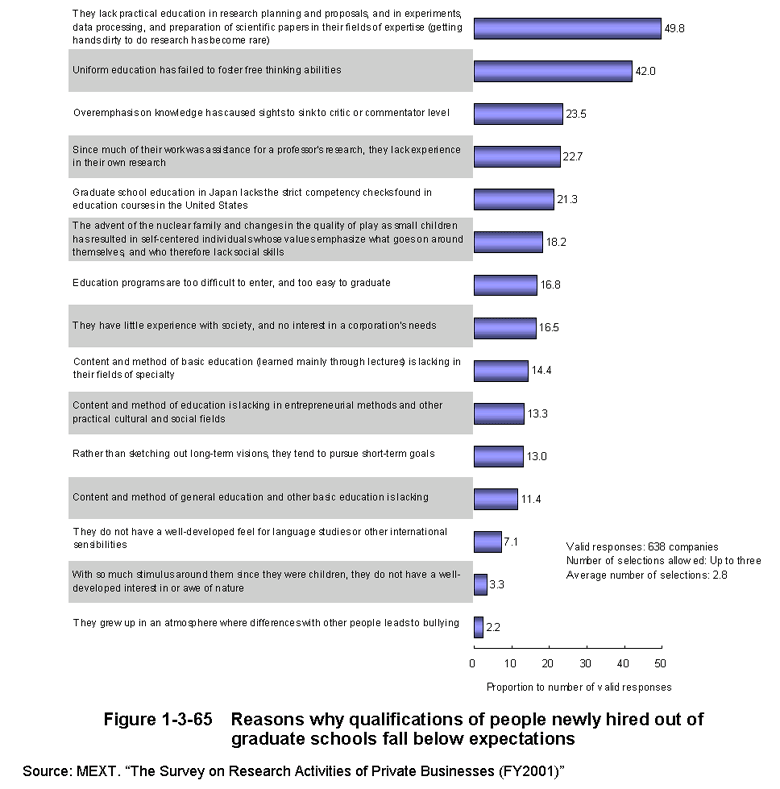
There are also expectations for expansion of internship programs,utilization of instructors from the private sector,and other forms of industrial-academic cooperation in the education arena.One such policy is cooperation between universities,national research institutions,and private-sector enterprises in a Graduate School Coordination Program8).
Note8)When graduate schools are recognized as offering a profitable education,students at graduate schools will also be recognized as receiving the necessary research guidance at research institutes,etc.(Standards for Establishment of Graduate Schools,No.13),and the cooperative graduate school system is an organized implementation of this program(see Section3-3-2).
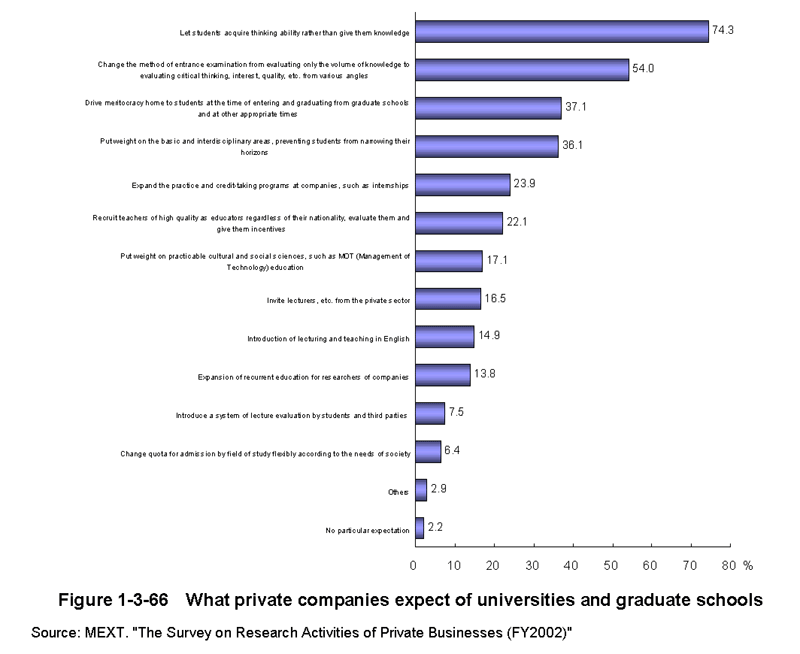
| (Employment of Doctoral Course Graduates,etc.) |
In Japan,the Ph.D.carries with it a powerful image of the great,distinguished scholar,as is evident from the saying,"In the end,either a Ph.D.or a Prince."Today,however,there is a need for young researcher to demonstrate Ph.D.potential in response to the needs of society.
According to a survey conducted by the U.S.National Science Foundation(1999),6.6%of scientific and technological human resources engaged in research and development at for-profit enterprises hold Ph.D.'s.In Japan,meanwhile,the Survey of Science and Technology Research(conducted in2002by the Ministry of Public Management,Home Affairs,Posts and Telecommunications,Statistics Bureau)found that just3.5%of researchers at corporations in Japan held Ph.D.'s.A survey of private-sector enterprises,however,revealed that corporations in Japan are slowly but steadily increasing the hiring of graduates of doctoral courses,and post-doctorals (Figure1-3-67) .
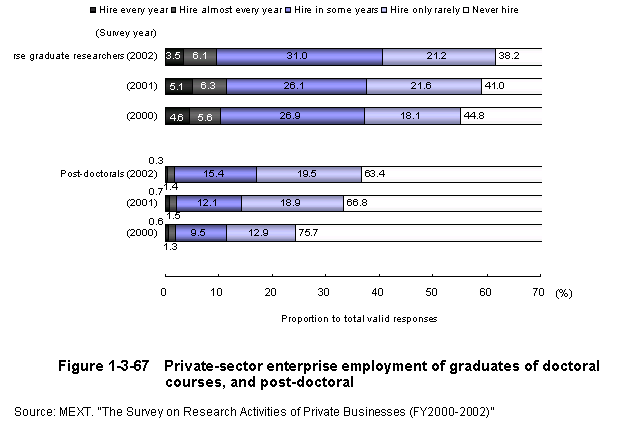
An evaluation of researchers who have completed doctoral course programs,and of post-doctorals,reports that corporations with experience in hiring Ph.D.holders and post-doctorals as researchers hold a high opinion of such researchers,as is evident from such comments as"knowledge and experience in specialist fields revitalized the research site."On the other hand,where expectations for knowledge,technology,and experience in specialist fields is high,and performance is also excellent,performance has not reached expectations in regards to originality (Figure1-3-68) .Meanwhile,a comparison with all young researchers,including non-Ph.D.holders,in terms of activity revealed no particular differences (Figure1-3-69) .Moreover,many corporations do not hire such researchers at all,because"most research activities in companies are not so sophisticated that there is no need to employ doctoral course graduate researchers or post-doctorals,"and"education and training of Bachelor or Master's degree researchers to boost in-house capabilities of researchers is more effective" (Figure1-3-68 , Table1-3-70) .
Corporations in Japan are today confronted with increasing demands for creation of new added value,and will therefore need to make more suitable evaluations and effective use of advanced specialist personnel like Ph.D.holders.The universities,as well,face demands to reform the content and method of education in their graduate school doctoral courses,based on corporate needs,so as to move toward fostering more creativity,and to create independent structures for cultivating human resources that are capable of responding to a wide range of needs.In addition,it is important for students advancing to the doctoral course level to be aware of what their objectives are,in order to boost added value.
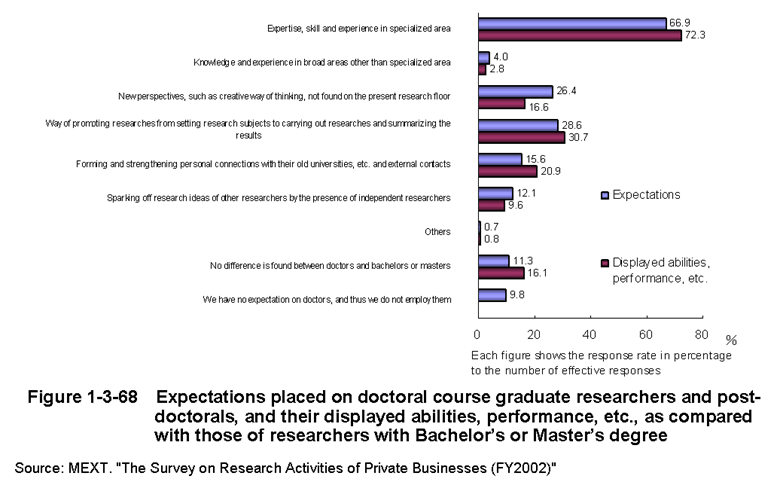
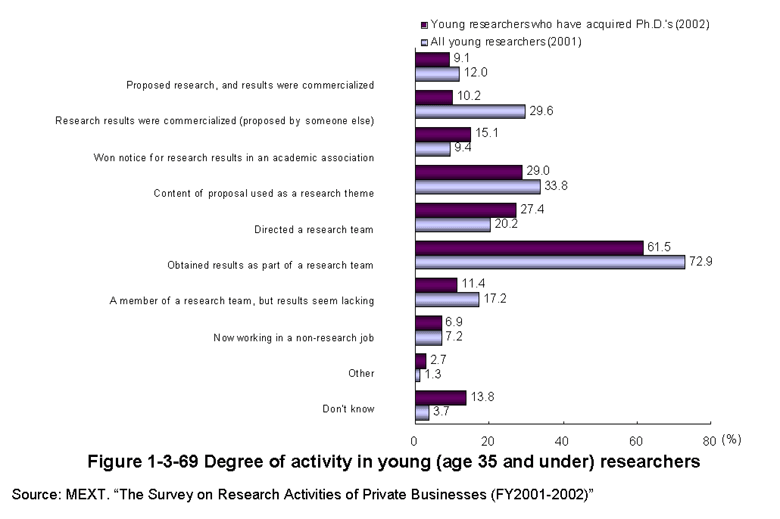
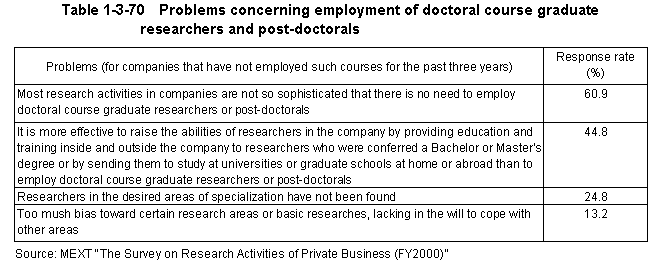
| (Needs for Researchers by Research Field) |
Society's human resource needs in terms of research sectors are also an important factor.With changing targets for corporate research,and changes in research sector priorities,there is a shortage of human resources in the four priority sectors of life sciences,information and communication technologies,environmental sciences,and nanotechnology and materials,as well as in the manufacturing technology sector,with only a few sectors experiencing an excess (Figure1-3-71) .Many corporations give the reasons listed in Table1-3-72 for why there is a shortage of researchers,while many of those admitting shortages give the responses to the shortage problem listed in Table1-3-73 .
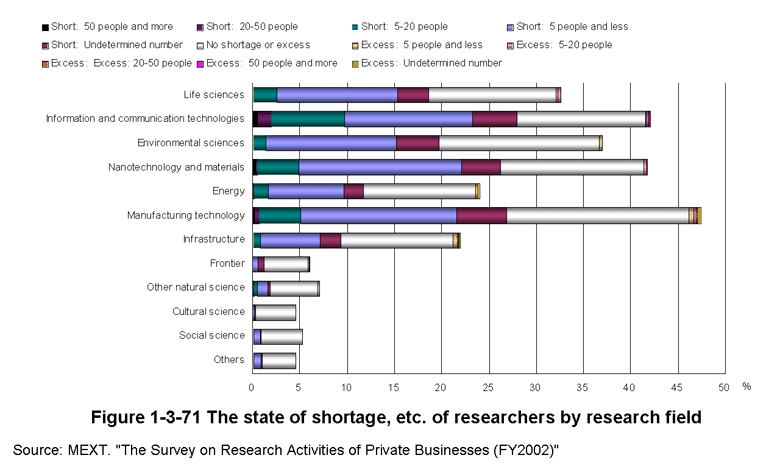


With nearly half of respondents agreeing that"the absolute number of researchers is short due to circumstances related to the recruitment of researchers and other similar reasons,"it would appear that corporations feel that situations are preventing them from hiring as they like even when they want to hire people.
The second most common reason given was"areas of specialization are increasingly diversifyed,so that there is a shortage of adaptable researchers,including recruits,"which shows that many respondents feel that they cannot find suitable human resources even when they want to hire.On the other hand,relatively few corporations want universities and graduate schools to"change quota for admission by field of study flexibly according to the needs of society"( Figure1-3-66 ),while a relatively large number expect"adaptability for flexible response to a wide array of sectors"( Figure1-3-64 ).These results appear to show that corporations even today look at employment over the relatively long term,and select human resources with an eye toward responding to changes in research sectors likely to be needed in the future.Moreover,they look for graduates of universities and graduate schools who have the basic elements and capabilities for responding to these kinds of changes,and who are adaptable and flexible.
National,public,and private graduate schools are all promoting efforts to increase the number of school entries for the life sciences,information and communication technologies,and the other two priority sectors,further boosting their ability to respond to society's needs in the future.
| (Importance of Re-education) |
As corporate operating structures are transformed,and as products and services are diversified and upgraded,the gap between the research and development needs of corporations and the skills possessed by existing individual researchers is expected to widen.Increased awareness by individuals of the need to polish their skills while continuing work,and greater opportunities for changing jobs,are increasing the need for adult education,and opportunities for re-education in various forms will need to be provided.
A look at education programs targeted at researchers in private-sector enterprises reveals that many corporations are outsourcing education,and also are dispatching employees to different sites and study programs in both Japan and abroad,to deepen understanding in specialist sectors.Less than half of corporations,however,utilize education programs for position transfers,upgrade or abolition of research themes,and other transformations of specialist sectors (Figure1-3-74) .This situation,as well,appears to be a warning to researchers that they should themselves be working on securing knowledge and skills.
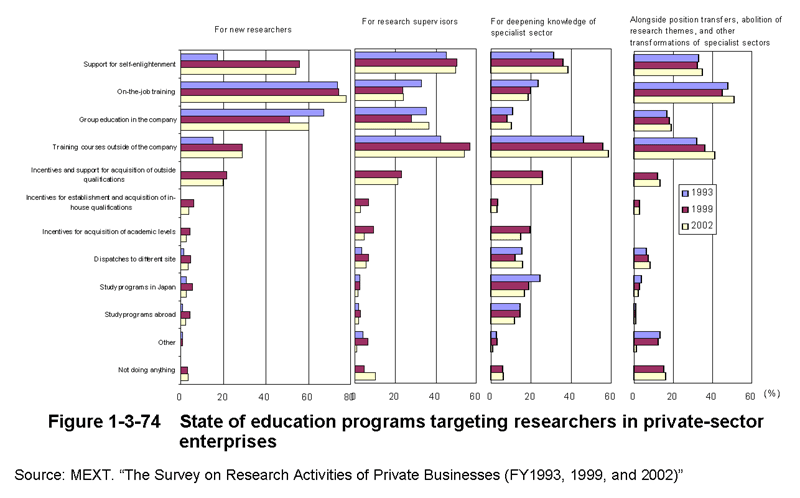
With the developments described above,the proportion of students who are returnees from society to graduate school is rising (Figure1-3-75) ,and the number of corporations asking universities to offer adult education targeted at researchers is expected to rise in the future.Moreover,demand by individual researchers for education opportunities is also expected to increase in the future,for boosting their own skills or acquiring skills in new sectors,as well as in preparation for an increased awareness of career change options.Expectations are high that universities can meet the need for re-education.
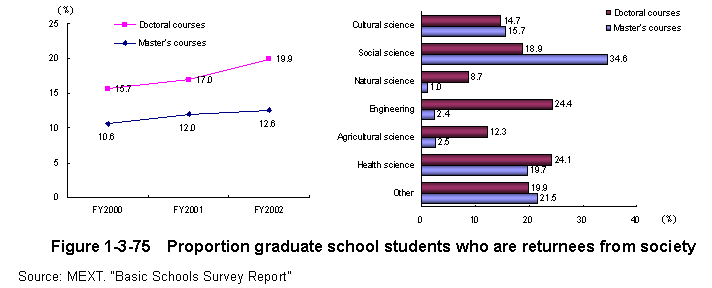
| (2)Development of Diversified Human Resources to Utilize Science and Technology for the Benefit of Society (Diverse HRST) |
In order to achieve Japan's goal as a scientific and technologically creative nation,researchers as well as human resources related to science and technology must demonstrate their skills.In private-sector enterprises,the shortage of researchers is mirrored by a shortage of human resources in other non-research job positions related to intellectual property rights or to other technologies(such as manufacturing,services,and quality control) (Figure1-3-76) .
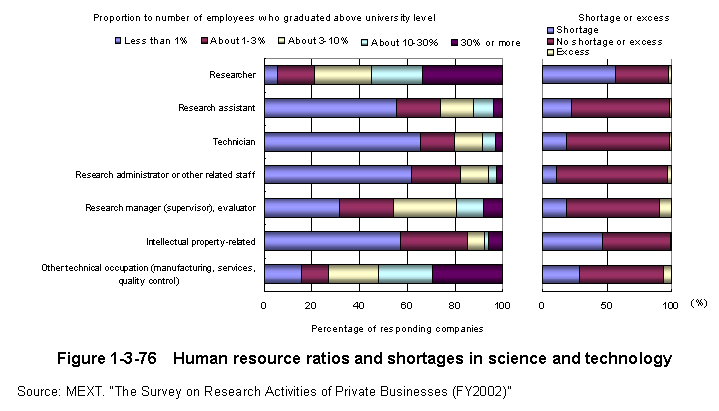
As can be seen,the shortage of HRST extends to business executives who can understand technology,evaluators(judges)who can clearly deter-mine the value of research,people who have a knowledge of the law,and can apply skills to intellectual property rights(not only patent attorneys,but also officials in charge of intellectual property at universities,research institutions,and private-sector enterprises),entrepreneurs who can link research results to business activities,and interpreters who are capable of explaining increasingly complex and detailed science and technology to the world at large.Among the human resources above who are involved in science and technology,this section focuses on technology-oriented business executives and intellectual property officers,both of whom are broadly engaged in corporate research and development strategy.
| (MOT(Management of Technology)Education) |
Corporations engaged in research and development need leaders who have both a sense of technology and a sense of business management.But the education system to date has not been designed to foster such personnel,and everything has been left up to the corporate leaders'own qualities and efforts.Lately,however,the spotlight has been turned on the MOT(Management of Technology)concept.MOT is management aimed at creation of continuous,innovative businesses that can serve as the engines for next-generation growth in corporations and organizations where technology is at the core of business.MOT programs facilitate learning that cuts across specialty domains necessary for corporate management.In the United States,more than200universities and graduate schools have already established MOT education courses,and students already number in the thousands (Figure1-3-77) .
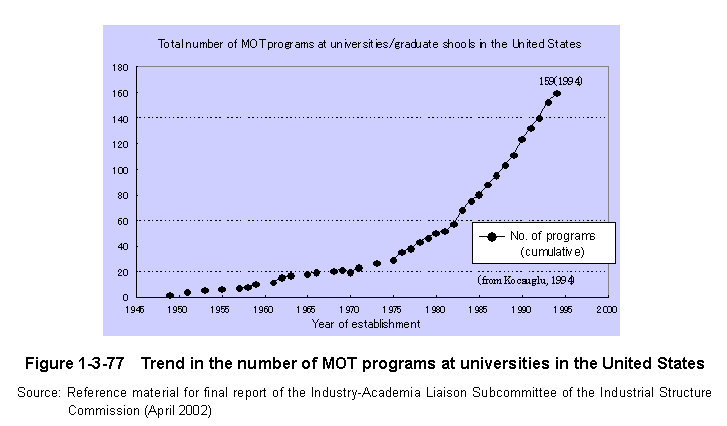
Moreover, Figure1-3-66 shows that17.1%of private-sector enterprises want universities and graduate schools to"put weight on practicable cultural and social sciences,such as MOT(Management of Technology)education,"and such needs are clearly becoming more important.In Japan,as well,the Ministry of Economy,Trade and Industry is at the center of a technology management consortium consisting of industry,universities,and private-sector educational institutions,and which has commenced activities to spread and promote technology management.The number of universities with MOT courses is also rising fast (Table1-3-78) .In addition,there are many corporations that use business development leaders in their30s for human resources development positions (Figure1-3-79) ,and expectations are high for fostering leaders who aim for perfection of technologies and managers who supervise technology and R&D departments,but also human resources who can aim for success of business projects and have an entrepreneurial sense.For this reason,there is a lot of demand for education content that includes management strategies for technology business projects and commercialization,project management,risk management,and other MOT-related needs.
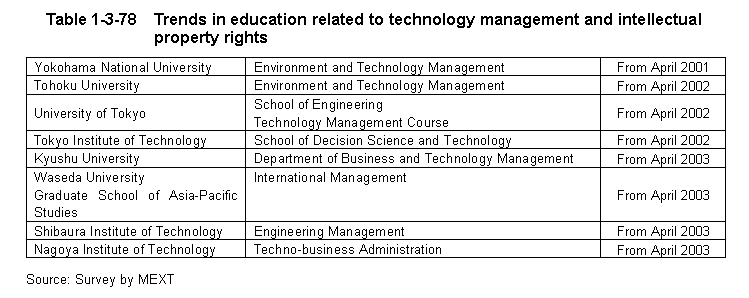
| (Development of Personnel Specializing in Intellectual Property) |
With concerns about the decline in the international competitiveness of Japan's domestic industry,and the increasing infringements on creators'profits due to the ease of copying and illegal reproduction of information in the wake of rapid advances in information technology,a national strategy has been launched to realize an"intellectual property nation"where intellectual property serves as the source for strengthening industrial competitiveness.The Intellectual Property Policy Outline was adopted in July2002,followed in December by promulgation of the Basic Law on Intellectual Property.In both of these documents,it is required that human resources specializing in conflict management,intellectual property licensing contracts,and other advanced specialist services be developed.
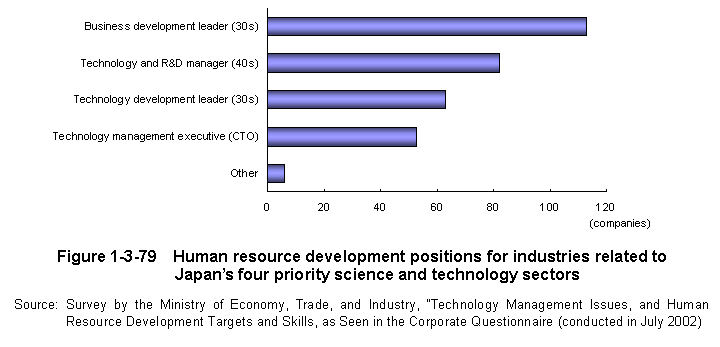
Regarding the fostering of human resources for intellectual property,the Intellectual Property Policy Outline proposed implementation of the following policies:
1.Strengthen education at graduate law schools in intellectual property and other fields of business-related law
2.Provide technology-oriented human resources with a deep understanding of business
3.Expand the number of patent attorney and other specialists,and strengthen their functions
The strategic outline also promoted design of programs and other policies toward establishment of graduate law schools,laying the groundwork for fostering human resources capable of handling Japan's intellectual property strategy.
| Back to Top | MEXT HOME |